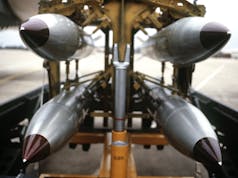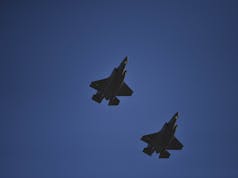Tornado jets engaged Islamic State south of Mosul, while a Reaper destroyed two vehicles in western Iraq.
A Ministry of Defence press release said:
“With eastern Mosul liberated from Daesh, Iraqi forces have conducted operations along the approaches to the western half of the city, supported by coalition aircraft.
A pair of Royal Air Force Tornados assisted Iraqi troops on Monday 30 January, some ten miles south of Mosul, on the west bank of the Tigris. The Tornados spotted machine-gun fire being directed at an Iraqi unit, and on investigating were able to identify a number of Daesh terrorists divided into three small groups. The Tornados used a pair of Paveway IV guided bombs to kill the members of two of these groups, while an attack by another coalition aircraft accounted for the third. In western Iraq, some forty miles south-west of the Al Asad airfield, a Reaper remotely piloted aircraft meanwhile tracked two trucks carrying several Daesh fighters. Both vehicles were struck in succession by Hellfires from the Reaper, and a series of secondary explosions from the vehicles’ cargo ensued for several minutes afterwards.”
In December 2016, it was reported that the Royal Air Force is operating at its most intense for 25 years in a single theatre of operation which far outstripped the UK involvement in Iraq and Afghanistan – RAF jets have dropped 11 times more bombs (1,276 strikes) on Syria and Iraq in the preceding 12 months than they had in the busiest year of action in Afghanistan a decade previously.
The cost of the operations against Islamic State and other details of the campaign were revealed in a briefing paper. In March 2015 the MoD confirmed that the net additional costs of the military air operation would be met from the Treasury Special Reserve; while the costs of training and equipping the Iraqi and Kurdish security forces, and the provision of key enablers, would be met from the MOD’s Deployed Military Activity Pool (DMAP).
In answer to a parliamentary question in September 2016 the MoD set the costs of the operation, between August 2014 and the 31st of March 2016, at £265 million (£45 million in the 2014-15 financial year, and £220 million in the 2015-16 financial year).












